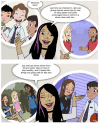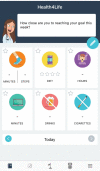Study protocol of the Health4Life initiative: a cluster randomised controlled trial of an eHealth school-based program targeting multiple lifestyle risk behaviours among young Australians
- PMID: 32665344
- PMCID: PMC7359380
- DOI: 10.1136/bmjopen-2019-035662
Study protocol of the Health4Life initiative: a cluster randomised controlled trial of an eHealth school-based program targeting multiple lifestyle risk behaviours among young Australians
Abstract
Introduction: Lifestyle risk behaviours, including alcohol use, smoking, poor diet, physical inactivity, poor sleep (duration and/or quality) and sedentary recreational screen time ('the Big 6'), are strong determinants of chronic disease. These behaviours often emerge during adolescence and co-occur. School-based interventions have the potential to address risk factors prior to the onset of disease, yet few eHealth school-based interventions target multiple behaviours concurrently. This paper describes the protocol of the Health4Life Initiative, an eHealth school-based intervention that concurrently addresses the Big 6 risk behaviours among secondary school students.
Methods and analysis: A multisite cluster randomised controlled trial will be conducted among year 7 students (11-13 years old) from 72 Australian schools. Stratified block randomisation will be used to assign schools to either the Health4Life intervention or an active control (health education as usual). Health4Life consists of (1) six web-based cartoon modules and accompanying activities delivered during health education (once per week for 6 weeks), and a smartphone application (universal prevention), and (2) additional app content, for students engaging in two or more risk behaviours when they are in years 8 and 9 (selective prevention). Students will complete online self-report questionnaires at baseline, post intervention, and 12, 24 and 36 months after baseline. Primary outcomes are consumption of sugar-sweetened beverages, moderate-to-vigorous physical activity, sleep duration, sedentary recreational screen time and uptake of alcohol and tobacco use.
Ethics and dissemination: This study has been approved by the University of Sydney (2018/882), NSW Department of Education (SERAP no. 2019006), University of Queensland (2019000037), Curtin University (HRE2019-0083) and relevant Catholic school committees. Results will be presented to schools and findings disseminated via peer-reviewed journals and scientific conferences. This will be the first evaluation of an eHealth intervention, spanning both universal and selective prevention, to simultaneously target six key lifestyle risk factors among adolescents.
Trial registration number: Australian New Zealand Clinical Trials Registry (ACTRN12619000431123), 18 March 2019.
Keywords: coronary heart disease; mental health; nutrition & dietetics; preventive medicine; public health; substance misuse.
© Author(s) (or their employer(s)) 2020. Re-use permitted under CC BY-NC. No commercial re-use. See rights and permissions. Published by BMJ.
Conflict of interest statement
Competing interests: None declared.
Figures
References
-
- Guerin N, White V. ASSAD 2017 Statistics & Trends: Australian Secondary Students’ Use of Tobacco, Alcohol, Over-the-counter Drugs, and Illicit Substances. Cancer Council Victoria, 2018.
-
- Active healthy kids Australia Physical literacy: do our kids have all the tools? the 2016 report card on physical activity for children and young people. Adelaide, 2016.
-
- Morley BSM, Niven P, Wakefield M. National secondary students' diet and activity (NaSSDA) survey, 2012-13. Melbourne, 2014.
Publication types
MeSH terms
Associated data
LinkOut - more resources
Full Text Sources
Medical





